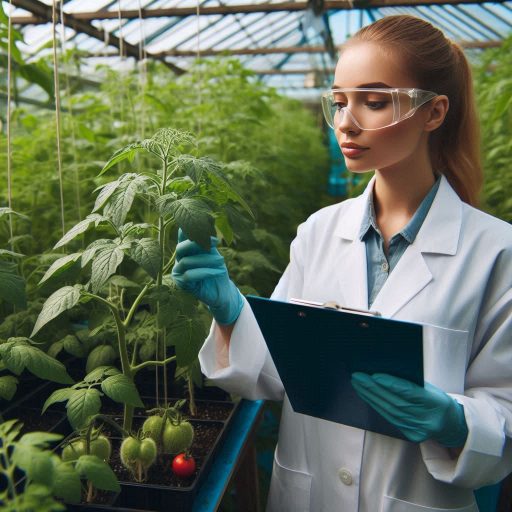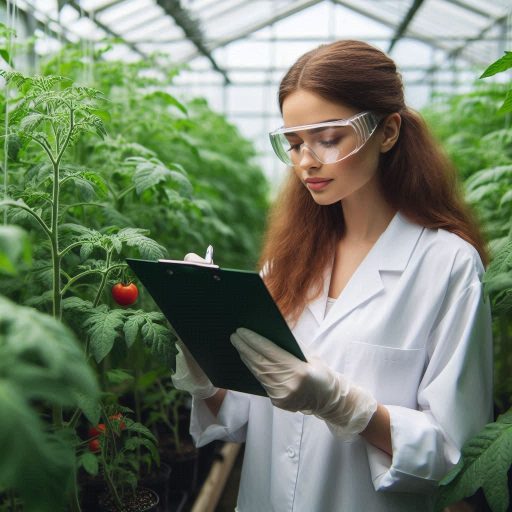Introduction
Plant science research is crucial for addressing global challenges, such as food security and environmental sustainability.
This field contributes to understanding plant biology, improving crop yields, and developing sustainable agricultural practices.
As the world’s population grows, innovative research becomes essential for ensuring food availability and ecological balance.
The rapid advancements in plant science are reshaping how we approach agriculture and environmental conservation.
New technologies, such as gene editing and precision agriculture, enhance our ability to modify plant traits effectively.
Additionally, researchers are exploring the potential of biotechnology to create resilient crop varieties that withstand climate change and pests.
In 2024, the latest research in plant science showcases exciting developments across various subfields.
Scientists are investigating plant-microbe interactions to improve nutrient uptake and disease resistance.
They are also exploring the genetic basis of drought tolerance, enabling crops to thrive in arid conditions.
Furthermore, researchers are focusing on sustainable farming practices that reduce chemical inputs and promote biodiversity.
In this blog post, we will delve into some of the most significant findings and studies in plant science for 2024.
By understanding these advancements, we can appreciate the vital role of plant science in shaping a sustainable future.
Plant Genetics
Exploration of Genetic Engineering Techniques in Modifying Plant Traits
In 2024, researchers continue to explore genetic engineering techniques for modifying plant traits.
These techniques allow scientists to enhance desirable characteristics in crops.
They include methods such as traditional breeding, transgenic techniques, and modern gene editing.
Genetic engineering provides solutions to agricultural challenges.
By modifying plant traits, scientists aim to improve yield, resilience, and nutritional quality.
Key traits targeted include drought tolerance, pest resistance, and enhanced growth rates.
The ability to modify specific traits increases efficiency in crop development.
Researchers can now pinpoint and alter genes responsible for specific characteristics.
This precision significantly reduces the time and resources needed to develop new plant varieties.
Discussion on CRISPR Technology in Creating Genetically Modified Crops
CRISPR technology has revolutionized the field of plant science.
This powerful gene-editing tool allows for precise modifications of plant genomes.
Researchers use CRISPR to target specific genes and introduce desired changes.
The application of CRISPR technology is expanding rapidly.
Scientists use it to create crops with improved traits, such as higher yields and increased resistance to diseases.
This technology enables the development of plants that can thrive in changing climate conditions.
One significant advantage of CRISPR is its speed.
Traditional breeding methods can take years to develop new varieties.
In contrast, CRISPR allows researchers to achieve results in a matter of months.
This acceleration is crucial for meeting the demands of a growing global population.
Impact of Gene Editing on Plant Growth, Disease Resistance, and Nutritional Content
Gene editing significantly impacts plant growth and health.
By enhancing disease resistance, gene-edited crops can withstand pathogens better than traditional varieties.
This improvement reduces the need for chemical pesticides, promoting more sustainable farming practices.
Nutritional content also benefits from gene editing techniques.
Scientists can increase levels of essential vitamins and minerals in crops.
This enhancement can play a vital role in addressing global malnutrition issues.
Researchers are currently focusing on biofortification strategies.
These strategies aim to improve the nutritional profile of staple crops.
Enhancing rice or wheat with additional nutrients can have a substantial impact on public health.
Furthermore, gene editing helps improve plant resilience against environmental stresses.
By modifying traits related to drought tolerance and salt resistance, scientists are developing crops that thrive in harsh conditions.
These advancements contribute to food security in regions affected by climate change.
The latest research in plant science for 2024 highlights significant advancements in genetic engineering techniques.
CRISPR technology has emerged as a leading method for creating genetically modified crops.
The impact of gene editing on plant growth, disease resistance, and nutritional content is profound.
As researchers continue to explore these avenues, they pave the way for sustainable agriculture and improved food security.
The future of plant science holds exciting possibilities for enhancing crops and addressing global challenges.
Read: Challenges and Rewards: The Dual Life of an U.S. Environmental Scientist
Climate change adaptation
Research on Plant Adaptation to Changing Climate Conditions
Recent research focuses on how plants can adapt to changing climate conditions.
Scientists study various plant species to understand their resilience mechanisms.
This research aims to identify traits that enhance survival in extreme environments.
Plants exhibit remarkable adaptability to environmental changes.
Some species can alter their growth patterns or physiological processes to cope with stress.
Researchers examine genetic variations that contribute to these adaptations.
By understanding these mechanisms, scientists can develop strategies to improve crop resilience.
Current studies utilize field experiments and laboratory simulations.
Researchers expose plants to varying climate conditions, such as drought, heat, and flooding.
These controlled studies help scientists observe plant responses and adaptations.
The findings can inform breeding programs for climate-resilient crops.
New Technologies for Improving Plant Resilience
Technological advancements play a significant role in enhancing plant resilience to extreme weather.
Researchers explore genetic engineering and biotechnology to develop climate-smart crops.
These technologies allow for precise modifications of plant genomes to improve desired traits.
One promising approach involves CRISPR technology.
CRISPR enables scientists to edit specific genes associated with stress responses.
This technique shows potential for developing crops that withstand heat, drought, and pests.
Additionally, researchers are investigating innovative irrigation techniques.
Precision agriculture tools monitor soil moisture levels and weather conditions.
These technologies enable farmers to apply water more efficiently, reducing waste while ensuring crops receive necessary hydration.
Remote sensing technology also aids in assessing plant health.
Satellite imagery and drones provide real-time data on crop conditions.
This information allows farmers to make informed decisions about crop management.
Importance of Studying Plant Responses to Climate Change
Studying plant responses to climate change is vital for global food security.
As climate conditions become more unpredictable, understanding plant adaptability helps ensure stable food production.
Crops must withstand extreme weather events to meet the increasing global food demand.
Research indicates that climate change could significantly impact agricultural yields.
Droughts, floods, and temperature fluctuations threaten crop health and productivity.
By understanding plant responses, scientists can develop strategies to mitigate these effects.
Moreover, breeding climate-resilient crops contributes to sustainable agriculture.
Farmers can cultivate varieties that thrive in challenging conditions.
This approach reduces reliance on chemical inputs and promotes environmental health.
Collaboration between researchers, farmers, and policymakers is essential.
By sharing knowledge and resources, they can implement effective solutions for food security.
Policies supporting research and innovation in plant science can drive progress toward sustainable farming practices.
The latest research in plant science focuses on how plants adapt to changing climate conditions.
By examining new technologies, scientists aim to improve plant resilience to extreme weather.
Understanding these adaptations is crucial for ensuring global food security.
Continued research and collaboration will lead to sustainable agricultural practices that can withstand the challenges posed by climate change.
The future of food security depends on our ability to adapt to a changing environment.
Read: Job Market Trends: Future of Chemistry Jobs in America
Sustainable Agriculture
Sustainable Farming Practices for Soil Health
The latest research in plant science emphasizes sustainable farming practices.
Scientists focus on methods that preserve soil health and enhance productivity.
Healthy soil is essential for supporting plant growth and maintaining ecosystems.
One critical area of research is soil conservation techniques.
These techniques include cover cropping, reduced tillage, and crop rotation.
Cover crops help protect the soil from erosion while improving nutrient content.
Reduced tillage minimizes soil disruption, promoting beneficial microbial activity.
Crop rotation prevents nutrient depletion and pest buildup, leading to healthier crops.
Recent studies highlight the benefits of organic farming methods.
Organic farming avoids synthetic fertilizers and pesticides, promoting natural soil fertility.
Researchers find that organic practices can improve soil structure and enhance water retention.
This research shows that organic methods contribute to long-term soil health.
Research on Organic Farming Methods
Recent research explores the impact of organic farming on plant growth.
Studies demonstrate that organic farming can lead to higher yields in some crops.
For example, researchers found that organic tomatoes produced more fruit than conventionally grown ones.
Organic farming practices promote biodiversity, which benefits plant growth.
Diverse crop systems support various beneficial organisms, enhancing pollination and pest control.
Researchers also highlight that organic systems often produce healthier plants with better resistance to diseases.
Additionally, studies show that organic methods can improve soil microbial communities.
Healthy microbial populations contribute to nutrient cycling and soil structure.
This research underscores the importance of organic practices in fostering vibrant ecosystems.
Integration of Agroecology Principles
Integrating agroecology principles into modern agriculture enhances long-term sustainability.
Agroecology combines ecological science with agricultural practices to create resilient farming systems.
Researchers emphasize the importance of understanding local ecosystems when implementing agricultural practices.
Agroecology promotes biodiversity, which is essential for maintaining healthy ecosystems.
Diverse agricultural systems can better withstand environmental stressors such as droughts and pests.
Research shows that farms implementing agroecological practices often experience increased resilience and reduced reliance on chemical inputs.
Furthermore, agroecological principles encourage collaboration between farmers and scientists.
This collaboration fosters innovative approaches to address local agricultural challenges.
By working together, farmers can implement research findings to improve their practices and sustainability.
In essence, the latest research in plant science focuses on sustainable farming practices to preserve soil health.
Scientists study soil conservation techniques and their impact on productivity.
They also explore organic farming methods and their positive effects on plant growth.
Moreover, integrating agroecology principles into modern agriculture promotes long-term sustainability.
These approaches not only enhance productivity but also support healthy ecosystems.
As researchers continue to investigate these areas, they contribute to building a more sustainable future for agriculture.
By adopting sustainable practices, farmers can ensure the health of their soil and crops.
This research ultimately leads to a more resilient agricultural system capable of meeting global food demands while protecting the environment.
Embracing these innovative methods will drive the future of plant science and sustainable farming.
Read: Challenges and Rewards: Navigating the Chemist Career Path

Plant-microbe Interactions
The Role of Beneficial Microbes in Enhancing Plant Growth
Recent research highlights the vital role of beneficial microbes in enhancing plant growth.
These microorganisms contribute to nutrient uptake, disease resistance, and overall plant health.
By forming symbiotic relationships with plants, beneficial microbes promote stronger root systems.
This relationship allows plants to access essential nutrients more efficiently.
Microbes like mycorrhizal fungi and rhizobacteria significantly improve plant growth.
Mycorrhizal fungi extend root networks, increasing nutrient absorption.
Rhizobacteria enhance plant health by promoting growth hormones and protecting against pathogens.
This mutualistic relationship leads to healthier plants that can withstand environmental stresses.
Research teams across the globe study these beneficial interactions.
Their findings reveal that microbial communities vary significantly among plant species.
Understanding these differences can help scientists tailor microbial applications to specific crops.
This knowledge aids in developing strategies to optimize plant health and productivity.
The Study of Plant Microbiome and Its Impact on Plant Health
The plant microbiome plays a critical role in shaping plant health.
Scientists are increasingly focused on understanding the complex interactions within these microbial communities.
The microbiome comprises bacteria, fungi, archaea, and viruses that inhabit plant surfaces and roots.
Recent studies emphasize the importance of microbial diversity in promoting plant resilience.
Diverse microbial communities contribute to better nutrient cycling and stress resistance.
Research shows that a balanced microbiome enhances plant growth, disease resistance, and nutrient absorption.
Advanced sequencing technologies have revolutionized our understanding of plant microbiomes.
These technologies allow scientists to analyze microbial communities in-depth.
By examining the microbiome’s structure, researchers can identify key players that support plant health.
Furthermore, studies reveal that environmental factors influence microbiome composition.
Soil type, moisture levels, and crop management practices affect microbial diversity.
Understanding these relationships helps scientists develop strategies to enhance microbiome health in various environments.
Potential Applications of Microbiome Research in Agriculture
The applications of microbiome research in agriculture are vast and promising.
By harnessing beneficial microbes, farmers can improve crop productivity sustainably.
Microbial inoculants can be applied to seeds or soil to enhance plant growth.
These inoculants can reduce the need for chemical fertilizers, promoting sustainable practices.
By increasing nutrient availability, farmers can improve soil health while reducing environmental impact.
This approach leads to more resilient agricultural systems capable of withstanding climate challenges.
Additionally, microbiome research can aid in developing disease-resistant crops.
By understanding how specific microbes protect plants from pathogens, scientists can create targeted interventions.
These strategies can minimize the use of chemical pesticides, leading to safer food production.
Moreover, using beneficial microbes in crop rotation practices can enhance soil health.
Rotating crops with different microbial needs promotes diverse microbial communities.
This diversity contributes to long-term soil fertility and crop sustainability.
The latest research in plant science emphasizes the importance of beneficial microbes in enhancing plant growth.
Understanding the plant microbiome and its impact on health is crucial for developing sustainable agricultural practices.
The potential applications of microbiome research can significantly boost crop productivity while promoting environmental health.
As scientists continue to explore these complex interactions, the future of agriculture looks promising and sustainable.
Read: Diverse Career Paths: From Chemist to Patent Attorney in the US
Biotechnology Advancements
Novel Biotechnological Tools for Plant Research
In 2024, plant science embraces several novel biotechnological tools.
These innovations enhance researchers’ ability to study plant functions and interactions.
One key development is CRISPR technology, which allows precise genome editing.
This tool enables scientists to make targeted modifications to plant DNA.
Researchers also utilize advanced sequencing techniques.
Next-generation sequencing provides insights into plant genomes and transcriptomes.
These methods allow for comprehensive analyses of gene expression and regulation.
As a result, scientists can uncover the genetic basis of various traits.
Additionally, metabolomics plays a vital role in plant research.
This approach analyzes metabolic profiles to understand plant responses to environmental changes.
By examining metabolites, researchers can identify pathways involved in stress tolerance and adaptation.
Overview of RNA Interference Technology
RNA interference (RNAi) technology has revolutionized plant research.
This technique allows scientists to study gene function by silencing specific genes.
Researchers use small interfering RNAs (siRNAs) to target messenger RNAs (mRNAs) for degradation.
This process reduces the expression of specific genes, revealing their functions.
RNAi technology has applications in various plant studies.
Scientists investigate how specific genes contribute to traits like growth, development, and stress responses.
Understanding these mechanisms helps researchers develop strategies for crop improvement.
Moreover, RNAi can also facilitate functional genomics.
By analyzing the effects of gene silencing, researchers gain insights into gene networks and interactions.
This knowledge is crucial for unraveling the complexities of plant biology.
Potential Applications of Biotechnology in Developing Disease-Resistant Plants
Biotechnology holds immense potential for developing disease-resistant plants.
Researchers focus on identifying resistance genes that protect plants from pathogens.
By incorporating these genes into crops, scientists can enhance disease resistance.
Genetic engineering is a primary approach for introducing resistance traits.
Scientists can transfer specific genes from resistant species into susceptible crops.
This method improves crop resilience against various diseases.
Furthermore, biotechnology allows for the development of markers for disease resistance.
Molecular markers help breeders select resistant plants more efficiently.
This approach accelerates the breeding process and improves crop yields.
Transgenic plants also play a significant role in disease resistance.
Scientists engineer crops to express antimicrobial peptides or proteins.
These modifications enhance plants’ natural defenses against pathogens, reducing the need for chemical pesticides.
Additionally, biotechnology can aid in developing plants that tolerate environmental stresses.
By engineering crops to withstand drought or salinity, researchers enhance food security.
This application is crucial in the face of climate change and increasing global demand for food.
In closing, the latest research in plant science highlights exciting advancements in biotechnology.
Novel tools like CRISPR, advanced sequencing, and metabolomics enhance our understanding of plant biology.
RNA interference technology allows for in-depth studies of gene function, revealing important mechanisms in plants.
Moreover, biotechnology offers promising solutions for developing disease-resistant plants, improving crop resilience, and enhancing food security.
As researchers continue to explore these innovations, the future of plant science looks bright, paving the way for sustainable agriculture and a more resilient food system.
Transform Your Career Today
Unlock a personalized career strategy that drives real results. Get tailored advice and a roadmap designed just for you.
Start NowFind Out More: Marine Biologist Collaboration with Other Scientists
Learn More: Impact of Forensic Science on Cold Cases
Plant Metabolomics
Examination of Plant Metabolites and Their Biological Functions
Recent research in plant science has highlighted the importance of plant metabolites.
These small molecules play crucial roles in plant growth, development, and defense.
They serve as chemical signals and contribute to interactions between plants and their environment.
Plant metabolites can be categorized into primary and secondary metabolites.
Primary metabolites are essential for basic plant functions.
They include carbohydrates, proteins, and lipids.
Secondary metabolites, on the other hand, are not essential for growth but provide ecological advantages.
These compounds often have roles in defense against pests and pathogens.
Researchers examine various plant metabolites to understand their biological functions better.
For example, flavonoids and terpenoids are studied for their antioxidant properties.
These metabolites can protect plants from environmental stressors, such as UV radiation and drought.
Understanding these functions can lead to the development of crops with enhanced resilience.
Importance of Metabolomics in Understanding Plant Physiology and Biochemistry
Metabolomics is a rapidly evolving field that focuses on studying the complete set of metabolites in a biological system.
It provides insights into plant physiology and biochemistry at a molecular level.
By analyzing metabolomic data, researchers can understand how plants respond to various environmental conditions.
This approach allows scientists to identify metabolic changes during different growth stages.
For instance, they can track how stress conditions impact metabolite production.
Understanding these changes helps in developing crops that can adapt to changing environments.
Moreover, metabolomics can reveal the genetic and biochemical pathways responsible for metabolite production.
By integrating metabolomic data with genomic and transcriptomic information, researchers can construct comprehensive metabolic networks.
This knowledge is crucial for improving crop traits and enhancing agricultural productivity.
Research on the Metabolic Pathways of Medicinal Plants for Drug Discovery
Research into the metabolic pathways of medicinal plants is gaining momentum in drug discovery.
Many pharmaceutical compounds originate from plant metabolites, making them valuable for medical research.
Scientists study these pathways to identify potential new drugs and therapeutic agents.
Medicinal plants contain a wealth of secondary metabolites with biological activities.
For example, alkaloids, flavonoids, and terpenes have shown promise in treating various diseases.
Researchers investigate how these compounds interact with biological systems and their mechanisms of action.
Recent studies utilize advanced techniques to profile metabolites in medicinal plants.
Mass spectrometry and nuclear magnetic resonance (NMR) spectroscopy allow for detailed analysis.
By understanding these metabolic pathways, scientists can optimize the extraction and synthesis of beneficial compounds.
Additionally, researchers explore the synergistic effects of multiple metabolites.
Some medicinal plants contain combinations of compounds that enhance their efficacy.
Identifying these interactions can lead to the development of more effective treatments.
In review, the latest research in plant science emphasizes the importance of plant metabolites and metabolomics.
Understanding the biological functions of metabolites enhances our knowledge of plant physiology and biochemistry.
Furthermore, researching the metabolic pathways of medicinal plants opens new avenues for drug discovery.
This field holds great promise for developing sustainable solutions to global health challenges.
As research advances, the potential for harnessing plant metabolites for various applications continues to grow.
Learn More: How Virologists Study Virus Evolution and Mutation
See Related Content: Why Choose a Career in Biostatistics?
Plant Breeding Techniques
Overview of Traditional and Modern Plant Breeding Methods
Plant breeding has evolved significantly over the years.
Traditional methods often rely on selecting plants with desirable traits for reproduction.
Farmers used these techniques for centuries to improve crop quality and yield.
They focused on visual characteristics, such as size and color, to guide their selections.
Modern plant breeding, however, incorporates scientific advances to enhance efficiency.
Techniques such as genetic engineering and molecular markers are now common.
These methods allow scientists to understand plant genetics at a deeper level.
As a result, breeders can create varieties with specific traits more effectively and faster.
Discussion on Marker-Assisted Breeding for Improving Crop Traits
Marker-assisted breeding is a modern approach that enhances traditional methods.
This technique uses molecular markers linked to desirable traits in plants.
By identifying these markers, breeders can select parent plants that carry advantageous genes.
For example, researchers can improve disease resistance by targeting specific markers associated with resistant traits.
This approach saves time compared to traditional breeding, which may require multiple generations of crossing plants.
Marker-assisted breeding also helps in developing stress-resistant varieties.
Breeders can identify plants that tolerate drought, heat, or salinity, which are critical as climate change progresses.
This method enables the selection of superior traits without relying solely on visible characteristics.
Impact of Advanced Breeding Techniques on Developing High-Yielding and Resilient Plant Varieties
Advanced breeding techniques have a profound impact on agriculture.
They contribute to developing high-yielding and resilient plant varieties.
For instance, researchers can now combine multiple traits in one plant, such as high yield and pest resistance.
These high-yielding varieties are essential to meet the demands of a growing population.
As global food demand increases, efficient breeding practices become vital.
Advanced techniques help maximize production on existing farmland, reducing the need for expanding agricultural land.
Moreover, resilient plant varieties can withstand harsh environmental conditions.
This resilience is crucial as climate variability continues to threaten global agriculture.
Breeders focus on creating crops that thrive in diverse environments while maintaining quality.
The integration of biotechnology into plant breeding also opens new opportunities.
Scientists can manipulate plant genes to enhance traits that benefit both farmers and consumers.
This manipulation often leads to crops with improved nutritional profiles, promoting better health.
In general, the latest research in plant science highlights the evolution of breeding methods.
Traditional approaches laid the foundation, while modern techniques, like marker-assisted breeding, enhance efficiency.
Advanced breeding practices significantly impact developing high-yielding and resilient plant varieties.
These innovations are essential to address global food security and adapt to changing environmental conditions.
As research progresses, plant breeding will continue to play a critical role in sustainable agriculture.
The future of food production depends on these scientific advancements in plant science.
Conclusion
The latest research in plant science for 2024 reveals several key insights.
Scientists have made significant progress in developing drought-resistant crop varieties.
This advancement is crucial as climate change continues to affect agricultural productivity.
Researchers are also exploring innovative techniques in gene editing to enhance crop resilience against pests and diseases.
Another important focus is on sustainable agricultural practices.
Studies highlight the benefits of integrating cover crops and crop rotation to improve soil health.
These methods can lead to increased yields while reducing the need for chemical fertilizers.
Furthermore, advancements in precision agriculture technologies allow for more efficient resource use, minimizing waste and environmental impact.
Ongoing advancements in plant science are essential for addressing global challenges.
As the world population grows, the demand for food will increase.
Plant scientists play a critical role in developing solutions for sustainable agriculture and food security.
We must support and invest in plant science research to continue these advancements.
Increased funding can help scientists explore new technologies and improve existing practices.
By prioritizing plant science, we can ensure a sustainable future for agriculture.
In summary, the insights from 2024’s research emphasize the importance of this field in securing food and environmental stability.




